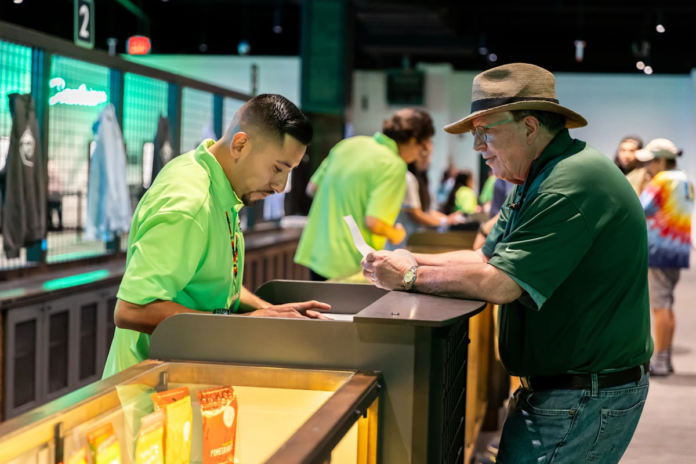CHEROKEE, NC – About 4,000 North Carolinians took advantage of their first opportunity to obtain legal weed over the weekend after a dispensary on Indian land opened to the public for the first time. The catch? If they step foot off the reservation with their purchases, they’ll be subject to incarceration and fines in one of the few states that has not legalized cannabis.
In North Carolina, possession of 0.5 ounces or less of cannabis is a Class 3 misdemeanor with a maximum fine of $200. Possession of 0.5 to 1.5 ounces is a Class 1 misdemeanor punishable by up to 45 days in jail and a fine of up to $1,000 for first-time offenders. Possession of any amount between 1.5 ounces and 10 pounds is a Class 1 felony punishable by up to eight months imprisonment and discretionary fines.
North Carolina’s 43rd Prosecutorial District Attorney Ashley Welch provided a measured response about the dispensary launch earlier this year.
“We respect tribal sovereignty, and we respect the Eastern Band of Cherokee Indians’ right to enact tribal laws,” Welch said. “In North Carolina, the cultivation, distribution, and possession of marijuana remains illegal, and we will continue to enforce state law off Qualla Boundary.”
According to the Raleigh News & Observer, possession charges in the state hit a ten-year low with just under 5,000 in 2023, down 76 percent from a peak of 20,800 charges in 2014.
The Eastern Band of Cherokee Indians (EBCI) launched the Great Smoky Cannabis Company medical cannabis dispensary, operated by Qualla Enterprises, LLC, in April. According to NPR, it marked the first time an Indigenous tribe sold cannabis to residents in a state without any cannabis regulations. In June, the tribal council passed a resolution to allow the sale of recreational cannabis, beginning with tribal members for the first 30-45 days before expanding to the general public on September 7.
North Carolina’s general public arrived by the thousands during opening weekend to purchase THC-rich cannabis flower, vaporizers, concentrates, edibles, and tinctures. On its Facebook page, the tribe called the launch “history in the making” with hundreds of people standing in long lines until dark. Some customers drove as much as six hours for an opportunity to purchase cannabis from a legal source.
“This is amazing to see so many people here,” James Bradley, Qualla Enterprises’ production manager, told The Charlotte Observer. “Recent polls in the state show 70 percent support for adult-use cannabis, some 80 percent.”
Qualla Enterprises General Manager Forrest Parker wouldn’t share internal revenue projections regarding the shop’s expansion from medical to adult-use, but he did cite a 2023 report conducted by HedgeRow Analysis showing the store could generate $385 million in sales in its first year. By year five, the report shows annual sales exceeding $800 million.
“The data has always said this was a strong opportunity, that people in this community, area, and state support this,” Parker said. “We make our decisions based with longevity in mind and how best to impact our community for years to come. And today gives us confidence that we made the right decision.”
North Carolina’s Great Smoky Cannabis Company is the most recent example of a recreational dispensary opening on tribal land in a state without adult-use sales, but it’s far from the only example.
Minnesota Governor and Democratic Vice Presidential nominee Tim Walz signed his state’s recreational cannabis bill into law in May 2023, with retail outlets expected to open for businesses in the first quarter of 2025. As part of this move, the state required Gov. Walz to establish formal agreements, or compacts, with Minnesota’s eleven federally recognized tribes for cannabis activities occurring beyond their reservation boundaries. Ongoing negotiations will shape how Minnesota’s tribes can engage with non-tribal businesses and consumers in the cannabis market.
“I believe the compacting process between the eleven federally recognized tribes within the territorial boundaries of Minnesota and the State of Minnesota will yield groundbreaking results for [those] tribes… and highlight the potential benefits that can be accessed by other tribes throughout the country who take the bold step of legalizing cannabis within their reservation lands,” said Mitchel Chargo, Esq. partner at Hinshaw & Culbertson LLP. Chargo represents Native American-owned cannabis entities, manufacturers, cultivators, retailers, and real estate companies in emerging cannabis markets.
According to the MinnPost, negotiations involve ten of the state’s eleven tribes with potential terms for tribal-owned dispensaries to operate outside reservation borders.
While definitive agreements have not been reached, the White Earth Nation is preparing to open an adult-use dispensary outside of its sovereign land in Moorhead, Minnesota. Zach Wilson, chief executive officer at Waabigwan Mashkiki dispensary, confirmed to Minnesota Public Radio News the tribally-owned company has leased a building in Moorhead. Wilson is “confident” his team’s application will yield a retail license and says they’re poised to pull the trigger fast if everything goes as they hope.
Michael Michaud is the chief executive officer at Sweetest Grass, a recreational dispensary on the Leech Lake Band of Ojibwe Reservation that opened to the public on June 6. With one dispensary under its belt on sovereign soil, the Leech Lake Band has its eyes set on expansion into Northern Minnesota.
“As the state prepares to open up the commercial dispensary opportunities, we know we are well established in the market with a loyal fan base,” said Michaud. “Because the state of Minnesota recognized the tribe’s sovereignty, we were able to establish our own regulations and tax code. We continue to work with the state of Minnesota to develop an agreement [compact] to establish off-reservation dispensaries and cultivation centers.”
North Carolina is the country’s ninth most populated state, followed by Michigan where regulators have collected roughly $1.2 billion in cannabis tax revenue since 2019. Last year, Michigan distributed $101.6 million in cannabis tax revenue to schools, $101.6 million to the transportation fund, and $87 million to counties and municipalities that host cannabis-related retail stores or microbusineses.











[…] Cherokee Tribe Draws Thousands Opening Weekend with First Adult-Use Dispensary in… […]
[…] Cherokee Tribe Draws Thousands Opening Weekend with First Adult-Use Dispensary in… […]